ABRAHAM RETURNS TO BEER-SHEBA
Paul says that God preached the gospel to Abraham, and certainly it was done here. “And in thy seed shall all the nations of the earth be blessed.” Today the gospel of Christ has gone out pretty much to all the world.
There are many who have not heard—that is true even in our own midst—but nevertheless, the blessing has come to all nations. And the only blessing the nations have is through Christ. “Because thou hast obeyed my voice.”
That obedience rested upon Abraham’s faith, and faith always will lead to action. “Faith without works is dead.”
The Lord adds another promise: All the nations of the earth will be blessed through Abraham’s offspring, something that happens unequivocally when Abraham’s descendant, Jesus, becomes the means by which all may come into God’s blessing of grace through faith (Genesis 22:18–19).
Genesis 22 ends with a list of the 12 children of Abraham’s brother Nahor.
One of those children, Bethuel, will become the father of Rebekah. Abraham’s son Isaac will eventually marry Rebekah (Genesis 24), and they will father Jacob, whose children will form the tribes of God’s chosen people, Israel.
Genesis 22:19-24 KJV
[19] So Abraham returned unto his young men, and they rose up and went together to Beer–sheba; and Abraham dwelt at Beer–sheba.
[20] And it came to pass after these things, that it was told Abraham, saying, Behold, Milcah, she hath also born children unto thy brother Nahor;
[21] Huz his firstborn, and Buz his brother, and Kemuel the father of Aram,
[22] And Chesed, and Hazo, and Pildash, and Jidlaph, and Bethuel.
[23] And Bethuel begat Rebekah: these eight Milcah did bear to Nahor, Abraham’s brother.
[24] And his concubine, whose name was Reumah, she bare also Tebah, and Gaham, and Thahash, and Maachah.
Genesis 22:19 KJV
So Abraham returned unto his young men, and they rose up and went together to Beer–sheba; and Abraham dwelt at Beer–sheba.
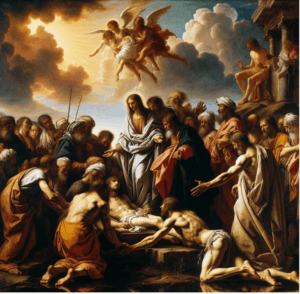 Yet remember that Abraham was not justified by his readiness to obey, but by the infinitely more noble obedience of Jesus Christ; his faith receiving this, relying on this, rejoicing in this, disposed and made him able for such wonderful self-denial and duty.
Yet remember that Abraham was not justified by his readiness to obey, but by the infinitely more noble obedience of Jesus Christ; his faith receiving this, relying on this, rejoicing in this, disposed and made him able for such wonderful self-denial and duty.
This is the final verse in the story of Abraham’s obedience in his willingness to sacrifice his only son at God’s command. Abraham has seen God’s goodness proven over and over, so he trusts that God has some good outcome in mind.
And, as expected, God intervenes to stop Isaac from being harmed, while providing an animal sacrifice (Genesis 22:11–13). When the ritual is completed, Abraham and Isaac go back down the mountain, to meet Abraham’s two servants.
The small company travels together back to Abraham’s home in Beersheba.
Though Abraham might not have known exactly what would happen when he left these two servants to go up the mountain, he was right: “I and the boy will go over there and worship and come again to you” (Genesis 22:5).
Genesis 22:20 KJV
And it came to pass after these things, that it was told Abraham, saying, Behold, Milcah, she hath also born children unto thy brother Nahor;
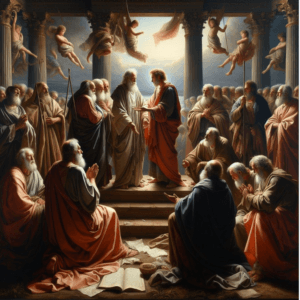 This chapter ends with some account of Nahor’s family, who had settled at Haran. This seems to be given for the connexion which it had with the church of God. From thence Isaac and Jacob took wives; and before the account of those events this list is recorded.
This chapter ends with some account of Nahor’s family, who had settled at Haran. This seems to be given for the connexion which it had with the church of God. From thence Isaac and Jacob took wives; and before the account of those events this list is recorded.
It shows that though Abraham saw his own family highly honoured with privileges, admitted into covenant, and blessed with the assurance of the promise, yet he did not look with disdain upon his relations, but was glad to hear of the increase and welfare of their families.
Sometime after the events described earlier in this chapter, perhaps years later, Abraham received news from the home he had left behind when God sent him to the land of Canaan.
The news was that his brother Nahor’s wife, Milcah, had born eight children over the years. This is quite the comparison to Sarah’s one child, Isaac.
The names of these children of Nahor and Milcah, as well as some of their grandchildren, are listed in the following verses. These notes are important mostly to establish the family history of Isaac’s eventual wife, Rebekah.
Genesis 22:21 KJV
Huz his firstborn, and Buz his brother, and Kemuel the father of Aram,
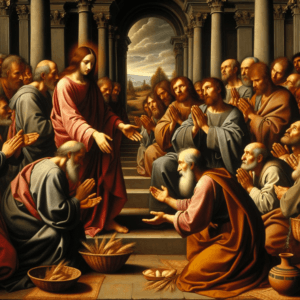 This brief record of what was told to Abraham about the children born to his brother Nahor, and specifically the reference to Nahor’s granddaughter Rebekah, serves as a link between the previous Abrahamic narratives and what follows.
This brief record of what was told to Abraham about the children born to his brother Nahor, and specifically the reference to Nahor’s granddaughter Rebekah, serves as a link between the previous Abrahamic narratives and what follows.
In the previous verse, Abraham learned some news about his extended family. Abraham had left his homeland when God called him to enter Canaan, and in the many years since, Abraham’s brother Nahor has fathered several children with his wife Milcah.
This and the following verses lists these nephews and nieces of Abraham. They include Buz, Uz, and Kemuel, who became the father of Aram. These names are given primarily because they explain the family history of Rebekah, Isaac’s future wife.
Genesis 22:22 KJV
And Chesed, and Hazo, and Pildash, and Jidlaph, and Bethuel.
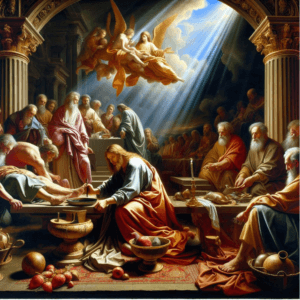 Abraham’s brother Nahor had twelve sons, whereas Abraham had only two-Ishmael and Isaac. How this must have tested Abraham’s faith concerning God’s promise of descendants as the stars of the sky!
Abraham’s brother Nahor had twelve sons, whereas Abraham had only two-Ishmael and Isaac. How this must have tested Abraham’s faith concerning God’s promise of descendants as the stars of the sky!
It may have prompted him to send Eliezer in search of a wife for Isaac. In verse 20, Abraham learned some news from the land he left behind when God called him to enter Canaan. Abraham’s brother Nahor had fathered several children with his wife Milcah.
They include Buz, Uz, and Kemuel, who became the father of Aram. Additional names given in this verse include Chesed, Hazo, Pildash, Jidlaph, and Bethuel. In the following verse, we’ll learn that Bethuel became the father of Rebekah.
Rebekah would eventually marry Abraham’s son Isaac.
Genesis 22:23 KJV
And Bethuel begat Rebekah: these eight Milcah did bear to Nahor, Abraham’s brother.
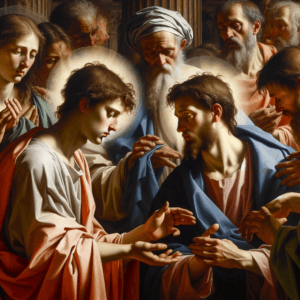 Notice the name Rebekah. In verse 20, Abraham learned that his brother Nahor had fathered several children with his wife Milcah. Nahor is still living in the land Abraham left behind when God called him to enter Canaan.
Notice the name Rebekah. In verse 20, Abraham learned that his brother Nahor had fathered several children with his wife Milcah. Nahor is still living in the land Abraham left behind when God called him to enter Canaan.
Now we learn that one of those children, Bethuel, became the father of Rebekah. Rebekah would go on to marry Abraham’s son, Isaac.
Together they will produce a son, Jacob, who will one day be renamed Israel, and whose children will form the tribes of God’s chosen people.
Genesis 22:24 KJV
And his concubine, whose name was Reumah, she bare also Tebah, and Gaham, and Thahash, and Maachah.
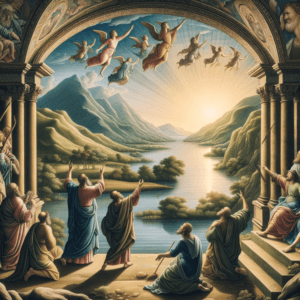 Concubine is often used to refer to those women who were inferior to the wives. In previous verses, Abraham learned that back in the land he left behind when God called him to enter Canaan, his brother Nahor had fathered eight children with his wife Milcah.
Concubine is often used to refer to those women who were inferior to the wives. In previous verses, Abraham learned that back in the land he left behind when God called him to enter Canaan, his brother Nahor had fathered eight children with his wife Milcah.
One of the eight, Bethuel, became the father of Rebekah. Abraham’s son Isaac would later marry Rebekah (Genesis 24). This is an important marriage, since Isaac and Rebekah will produce a son, Jacob, whom God will later rename Israel.
This makes Isaac and Rebekah the grandparents of God’s chosen people. Now we learn that Nahor fathered an additional four children with Reumah, his concubine.
It’s hard to miss that in the time it took Abraham to father two children, Ishmael and Isaac, his brother had fathered 12 offspring. We’re not told how this news impacted Abraham.
Was he excited for the expansion of the family line?
Was he sad or discouraged?
We don’t know. We do know that he continued to trust God to keep His promises. The next chapter provides evidence of Abraham’s confidence that the land of Canaan would become the land of his offspring.
I hope that you have really enjoyed this post,
Please Leave All Comments in the Comment Box Below ↓

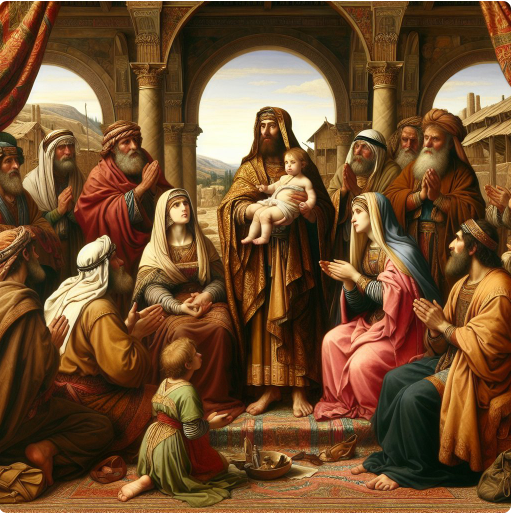











I have always respected the exploration of Abraham’s faith and God’s promises in Genesis 22.
It’s inspiring to see how Abraham’s obedience, rooted in faith, laid the foundation for blessings that extend to all nations through Christ. The reflection on the linkage to Rebekah and the unfolding of God’s plan through generations adds depth to understanding God’s providence in Abraham’s story, and I like the way you laid that out. I always feel blessed by how the theme of faith and obedience in Abraham’s journey influences our own faith today.
Do you think Abraham’s willingness to obey God’s command to sacrifice Isaac reflects the depth of his faith and trust in God’s ultimate plan?
God Speed
David
Hello David,
I appreciate you taking the time to let me know that you feel it is inspiring to see how Abraham’s obedience, rooted in faith, laid the foundation for blessings that extend to all nations through Christ.
Abraham promptly responded to God’s calling by taking Isaac without delay to the appointed place for the sacrifice. From this, God reveals that true faith is responsive to His calling.
Thank you so much for commenting,
Blessings My Friend!
This is a very interesting read on Abraham and the history tree of the extended family.
I am confused though as you mention that Nahor’s wife, Milcah, had eight children. But then you also mention that Nahor had twelve sons. So did Nahor have more than one wife?
Or did he father these children with concubines?
I never knew that Isaac’s wife, Rebekah, was actually the granddaughter of Abraham’s brother, Nahor. So it effectively made them blood relations.
Do you think it would be allowed in modern times?
Thank you for clarifying.
Hello LineCowley,
Thank you so much for being a loyal HBS & DwJ commenter.
The answer to your questions are direct in:
Genesis 22:20-24 KJV
[20] And it came to pass after these things, that it was told Abraham, saying, Behold, Milcah, she hath also born children unto thy brother Nahor;
[21] Huz his firstborn, and Buz his brother, and Kemuel the father of Aram,
[22] And Chesed, and Hazo, and Pildash, and Jidlaph, and Bethuel.
[23] And Bethuel begat Rebekah: these eight Milcah did bear to Nahor, Abraham’s brother.
[24] And his concubine, whose name was Reumah, she bare also Tebah, and Gaham, and Thahash, and Maachah.
If you add Milcah’s eight children with Nahor’s concubine’s four children, that equals twelve children fathered by Nahor.
You are most certainly welcome for the clarification,
Blessings My Friend!
Hello!
I’ve always thought that Abraham’s obedience to God was amazing.
How can your faith be so great that you’re ready to sacrifice your own son, without even arguing?
It’s amazing!
However, I didn’t know that because of Abraham’s obedience, his whole family was accepted into the covenant! This explains why Abraham only wanted a woman from his own family for his son Isaac…
Hello angelce903,
You are correct, this is a spiritual issue, Abraham does not want to risk the identity of his descendants as God’s chosen ones.
Please visit us again,
Blessings My Friend!
The article provides a rich blend of theological depth and narrative insight, inviting readers to appreciate both the immediate and far-reaching implications of Abraham’s story.
It connects the dots between the Old Testament promises and their fulfillment in Christ, making it relevant to contemporary readers who are exploring the foundations of their faith. The reflection on Abraham’s obedience, faith, and God’s unwavering promises is both inspiring and educational, offering a holistic view of one of the most pivotal moments in biblical history.
In summary, this piece serves as a valuable resource for those seeking to deepen their understanding of Genesis 22, its theological significance, and its place within the broader biblical narrative. It encourages readers to reflect on their own faith journey, drawing parallels between Abraham’s experiences and the ultimate fulfillment of God’s promises through Christ.
Hello S.J,
First of all, I want to welcome you to the HBS & DwJ platform.
Thank you for your insightful comment! your perspective is definitely appreciated, and your feedback is valued. Comments like yours helps this platform to grow beyond imagination.
Please feel free to stop by anytime. You can also check out the HBS & DwJ podcast wherever you get your podcast.
Thanks for stopping by,
Blessings My Friend!
Dear HBS & DwJ,
I am writing to you in response to your enlightening discussion on Abraham’s return to Beer-Sheba.
As a God-fearing believer who is far from perfect, your words resonated deeply with me. I am captivated by the faith and obedience of Abraham, and his trust in God’s design, even when the path was unclear and uncomfortable. It’s a testament to the power of unwavering faith and trust in God’s promise.
Your emphasis on the significance of faith and actions, as demonstrated through Abraham’s life, compels me to reflect upon my own life. “Faith without works is dead,” you quoted, a powerful reminder that faith is not merely a passive belief, but an active commitment to living out God’s will. As a sinner, I falter and stray, yet I am inspired to strive for a faith as solid as Abraham’s, to heed the call of God even when it’s challenging, and to trust in His divine plan.
The lineage of Abraham, Isaac, and Jacob, and the eventual formation of God’s chosen people, is fascinating. I am reminded that God works His miracles across generations. We are all a part of God’s grand plan, and our actions today can resonate through the ages, much like Abraham’s faithfulness led to the formation of the tribes of Israel.
The comparison between Nahor’s twelve children and Abraham’s two sons, Ishmael and Isaac, struck me. I pondered on whether Abraham felt tested, considering God’s promise of descendants as numerous as the stars. The fact that Abraham continued to trust God, even when his circumstances seemed to contradict God’s promise, teaches me a valuable lesson. It’s about trusting God’s timing and not comparing our blessings to others.
In my sinful nature, I often question God’s plan, especially when things don’t go my way. But your discussion reassured me that instead of doubting His plans, I should lean into my faith, as Abraham did. Regardless of my imperfections and sins, the grace and mercy of God are inexhaustible.
Thank you for sharing this insightful discussion. Your words have inspired me to continue striving towards a stronger faith and trust in God, even in the face of my sins.
God bless you,
Eric
Hello Eric,
Thank you for stopping by this HBS & DwJ platform, continuing to add value to it through your participation.
Being a GOD-fearing believer who acknowledges imperfection is a profound stance. It suggests humility and a strong faith despite personal shortcomings. It’s a recognition that while one strives to live according to their beliefs, they understand the inherent flaws of being human. This perspective often fosters compassion and empathy towards others who are also imperfect. Thanks for sharing your personal stance on this.
It pleases me to learn that my words have inspired you to continue striving towards a stronger faith and trust in GOD. This is the exact reason I created the HBS & DwJ website, which turned into HBS & DwJ podcast, and branched out into HBSandDwJ online store as well.
You are welcome for the sharing of this insightful discussion. Please continue stopping by for additional education in Holy Bible Study.
Looking forward to hearing from you soon,
Blessings My Friend!